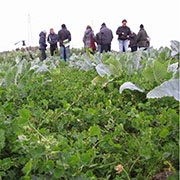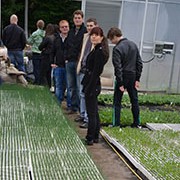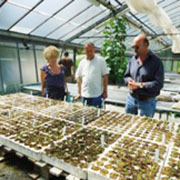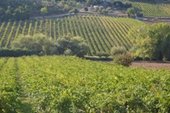InterVeg



More about the project
Main results and conclusions
Cover crops in organically managed agro-ecosystems represent an important tool to manage all at once soil fertility, pests, disease and weeds. Cover crops are usually not so common in specialized vegetable systems but they can be introduced as living mulch, intercropped with cash crops. If this management option is chosen it is important to reduce the competition between the main and cover crop and to use a crop management strategy able to optimize the ecological services within the field and the farm as a whole.
The INTERVEG partners settled parallel experimental field trials in 4 EU countries (Italy, Denmark, Slovenia and Germany) to evaluate the effect of introducing living mulches in organic vegetable production systems. Cover crop sowing period, root pruning as well as spacing or yielding crop and cover crop density are the relevant factors that were under investigation in order to optimize the performance of the living mulched agro-ecosystems in comparison with the sole crop systems. The selected yielding crops had been identified as cauliflower for the 4 countries, artichoke for Italy and leek for the other three countries.
A total of 12 field experiments have been carried out during the project spam: 8 in research farms of the research Institutions involved in the project and 8 in commercial organic farms (on-farm research). A detailed list of common measurement has been set up and, accordingly, results have been collected in each location.
The data collected include yield and marketable yield, number of plants, N, P, K content, soil, water, competition indices for weeds, cover and cash crops. In addition data on pest and beneficial insects, energy consumption and costs have been also collected in the different European areas. Since also commercial organic farms are involved in the project as pilot farms, the effect of living mulch at larger scale, such as impact on pest and beneficial insects has been evaluated. On-farm research activities were also aimed to encourage farmers involvement and to support dissemination activities.
InterVeg
 7 partners, 4 countries
7 partners, 4 countries
Coordinator
Senior researcher
Stefano Canali, Agricultural Research Council - Research centre for the soil plant system
(CRA-RPS), Italy
Partners
Fabio Tittarelli
Gabriele Campanelli
and Corrado Ciaccia,
Research centre for the soil plant system (CRA)
(2 Research Centers: RPS and ORA), Italy
Livia Ortolani
Cristina Micheloni, Associazione Italiana Agricoltura Biologica (AIAB), Italy
Giovanni Burgio, Università di Bologna, Italy
Peter von Fragstein und Niemsdorff, University of Kassel, Germany
Hanne L. Kristensen, Aarhus University, Denmark
Martina Bavec, University of Maribor, Slovenia
Project stakeholders
Main target group of the project are vegetable growers (organic and interested to conversion) who can make practical use of the project outcome. But important users will be as well extension experts (who can facilitate the knowledge transfer towards producers) and local authorities (who can urge and support the implementation of project outcome in their territories farms).
All this for the countries directly involved in the project as well as for other countries where the experience can be shared.
